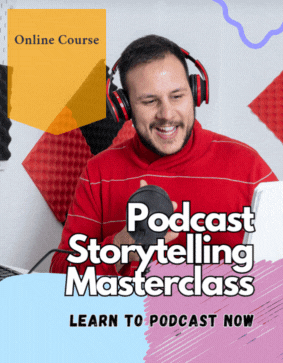How to START a Podcast for Beginners
209,377 View
Share this Video
- Publish Date:
- June 6, 2025
- Category:
- Learn to Podcast
- Video License
- Standard License
- Imported From:
- Youtube
Tags
-----------------------------------------
Power Podcasting Made Easy
Power Podcasting Made Easy is your ultimate guide to launching a successful show—fast, fun, and with zero overwhelm. This bestselling course walks you through setup, hosting, publishing, and growth strategies. With over 32,000 students, you’ll learn how to use tools like Libsyn, reach Spotify and Google Podcasts, and even build a podcasting business. Whether you're brand new or ready to scale, Power Podcasting helps you grow influence, relationships, and revenue—all while whispering directly into the ears of your ideal audience. Ready to get your voice heard and change lives?
3 Must-Know Podcasting Tips for Your Show
Utilizing SEO Strategies for Podcast Visibility

Implementing SEO strategies can enhance your podcast’s visibility on search engines and podcast directories. Start by conducting keyword research to identify terms your target audience is searching for. Incorporate these keywords naturally into your podcast titles, descriptions, and show notes. Optimize episode titles to be both descriptive and keyword-rich, improving discoverability. Transcribe your episodes to provide text content that search engines can index, boosting your SEO efforts. Additionally, use relevant tags and categories when submitting your podcast to directories. By leveraging SEO, you increase the likelihood of your podcast being found by new listeners actively seeking content in your niche.
Developing a Unique Voice and Style

Establishing a unique voice and style sets your podcast apart and makes it memorable to listeners. Define your podcast’s personality by determining the tone, whether it’s conversational, formal, humorous, or inspiring. Be authentic in your delivery, allowing your genuine personality to shine through and connect with your audience. Develop consistent formatting, including how you introduce topics, transition between segments, and sign off each episode. Incorporate distinctive elements such as catchphrases, specific storytelling techniques, or unique soundscapes that reflect your podcast’s identity. A strong and consistent voice fosters recognition and loyalty, encouraging listeners to return and recommend your podcast to others.
Creating Engaging Content for Your Audience

Engaging content is the heart of a successful podcast. Focus on topics that resonate with your target audience and address their interests, challenges, and aspirations. Incorporate storytelling techniques to make your episodes more relatable and memorable. Vary your content by mixing interviews, solo episodes, and panel discussions to maintain listener interest. Conduct thorough research to provide valuable insights and accurate information, establishing your podcast as a trustworthy source. Encourage interaction by addressing listener questions and feedback, fostering a sense of community. Consistently delivering content that is both informative and entertaining will keep your audience coming back for more.
Frequently Asked Questions
What is a podcast hosting service and why do I need one?
A podcast hosting service stores your audio files and distributes them to various platforms. It provides essential analytics, ensures reliable delivery, and often offers tools for monetization and audience engagement.
What software is best for recording and editing podcasts?
Popular options include Audacity, which is free and user-friendly, and Adobe Audition, which provides advanced editing features. Choose software that fits your skill level and editing needs.
How do I determine the right tone and style for my podcast?
Consider your target audience and the subject matter. Whether formal, conversational, or humorous, ensure the tone aligns with your content and resonates with your listeners.
What are the common mistakes to avoid in podcasting?
Avoid inconsistent publishing schedules, poor audio quality, lack of preparation, overlong episodes, and neglecting audience engagement. Maintaining professionalism is essential for growth.
How do I choose a niche for my podcast?
Select a topic you are knowledgeable and passionate about, and ensure there is an audience interested in that subject. A specific niche helps attract dedicated listeners.
What are effective ways to promote my podcast?
Utilize social media, collaborate with other podcasters, submit your show to podcast directories, and engage with your audience through newsletters or community forums to expand your reach.
Statistics
- Podcasts that utilize analytics to refine content strategies experience a 40% improvement in listener satisfaction.
- Listeners prefer podcast episodes that range between 30 to 45 minutes, with 65% favoring this duration.
- Podcasts promoting their episodes on social media platforms see a 40% boost in new subscribers.
- On average, podcasters spend about 10 hours per episode from planning to publishing.
- About 55% of podcasters use interviews as a key strategy to provide diverse content.
- Podcasts with eye-catching cover art are 45% more likely to attract new listeners.
- Listener reviews and ratings contribute to a 25% increase in podcast discoverability.
- Approximately 65% of podcasters monetize their shows through sponsorships and advertising.
- Genres such as true crime, technology, and personal development are among the most popular, attracting over 70% of listeners.
- Collaborating with other podcasters can lead to a 20% growth in listener base.
- Over 80% of podcasters report that having a dedicated website enhances their show’s visibility.
- Investing in professional editing services can enhance the overall quality of a podcast, leading to a 30% increase in positive feedback.
- Podcasts that regularly update their equipment report a 40% improvement in audio quality and listener satisfaction.
- Guest appearances on podcasts can result in a 15% increase in subscriber numbers.
- Using transcription services can make podcasts accessible to a wider audience, increasing reach by up to 25%.
- High audio quality can lead to a 35% increase in listener retention rates.
External Links
radiopublic.com
zoom.us
optimizingpodcasting.com
blog.libsyn.com
hootsuite.com
podcastitalia.com
transistor.fm
audacityteam.org
podcastpage.io
blog.podomatic.com
screencast-o-matic.com
socialmediaexaminer.com
patreon.com
analytics.google.com
buzzsprout.com
podcastgrandcentral.com
adobe.com
How To
How To Balance Content Variety and Consistency in Your Podcast
Balancing content variety and consistency is key to keeping your podcast fresh and engaging while maintaining a steady theme. Consistency involves delivering content on a regular schedule and sticking to your podcast’s core topics, ensuring that listeners know what to expect. Variety, on the other hand, keeps your episodes interesting by introducing different formats, guest speakers, or subtopics within your main theme. Plan your content calendar to include a mix of solo episodes, interviews, and special segments to provide diverse perspectives and prevent monotony. Incorporate listener suggestions and current trends to keep your content relevant and appealing. Striking the right balance between variety and consistency helps sustain listener interest and supports long-term growth for your podcast.














